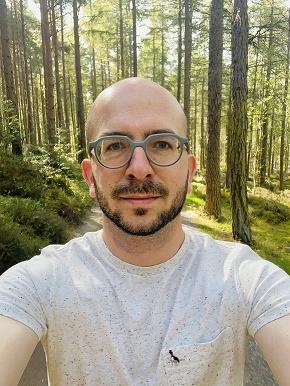Solmeng-Jonas Hirschi

Postdoctoral Researcher
Guest Scientist/ ZODIAC fellow Oct 2023 - Jan 2024
Room 009
14195 Berlin
Solmeng-Jonas Hirschi is a researcher in ancient philosophy, specializing in Epicureanism and papyrology. He received his Master in 2016 and completed his Ph.D. in 2021 as a Berrow Scholar at the University of Oxford. Hirschi has worked as a postdoctoral fellow at the Université de Fribourg, as a visiting scholar at the Université Laval in Québec, and as a fellow at the Swiss Institute in Rome. His research has included provenance research of papyri, the editing of an eighteenth-century speech rich in ancient exempla, textual criticism of a Greek particle in the so-called Clarke Plato, and narratological analyses of person deixis in the letters of Epicurus. More recently, his research has focused on the study of Epicurus' conception of time(s).
Project Abstract
Epicurus' conception of time is notoriously complex. On the one hand, his Letter to Herodotus explicitly defines time as a purely internal, at best intersubjective phenomenon, based on the perception of events and their relative durations. On the other hand, there occasionally seems to be an absolute time frame for atomic motion, both in his On Nature and in Lucretius' pendant. It is not clear how these two times are to be reconciled, nor whether they can be. One possible, fresh way to look at this is to analyze Epicurus' approach to other topics and concepts related to time, time computation, and regularity, such as memory or celestial phenomena.
As it happens, Epicurus is particularly verbose on the subject of celestial phenomena. In his Letter to Pythocles, he discusses the causes and workings of many recurring meteorological and astral events, responding to well-established debates in the earlier writings of Eudoxus, Aristotle, and Theophrastus.
My project focuses on a particular case where Epicurus ambiguously offers what would be a very early philosophical response to the Babylonian zodiac in ancient Greece. Finding out what sources Epicurus used and how he used them can help to understand his reaction to what would soon become one of the most successful, complex, and influential time divisions in the Mediterranean. For this project I am working closely with the ZODIAC team led by Prof. Mathieu Ossendrijver.
Curriculum vitae
Education
Ph.D. in Classical Languages (2021), University of Oxford
MSt in Classical Languages (2016), University of Oxford
BA in Classics (2015), University of Bern
Fellowships and Positions
2023-2024
EC-Chronoi Fellow: Exploration Project "Epicurus and the Zodiac".
2022-2023
Fellow at the Swiss Institute in Rome: "De Temps en Temps - Epicure, Bergson, McTaggart".
2022
Guest researcher at the Institut d'études anciennes et médiévales (IEAM Quebec): Exploration of the feasibility of 'hive-editing' ancient texts based on manuscript transcriptions aligned with IIIF images.
2021-2023
Postdoctoral assistant at the Institut für Antike und Byzanz (IAB), University of Fribourg: teaching and starting the catalog of the papyri of the Bible+Orient Museum of the University.
2016-2021
Ph.D. candidate in Classical Languages at the University of Oxford (Lincoln College): "Epicurus' Human Being - Beyond Person and Self", supervised by Prof. Tobias Reinhardt.
Selected Publications
Submitted, co authour with Thomas Schmidt. "A New Papyrus Fragment of Dinarchus in Demosthenem 58." In In the Name of the Rose, edited by Renate Burri. Turnhout: Brepols.
Forthcoming (2024). Epicurus’ Human Beings. Beyond Person and Self. Oxford: Oxford University Press.
2023, co-author with Angéline Rais. "Taxer avec épicure: Le Discours de Samuel Engel devant l’Äusserer Stand de Berne." In Chanter l’histoire en réveillant les sources. Mélanges d’histoire(s) offerts au professeur Jean-Daniel Morerod, edited by Bartolini Lionel, Oguey Grégoire and Deléderray-Oguey Isaline, 363–96. Neuchâtel: Alphil.
2017, ed. with Beatrice Wyss and Rainer Hirsch-Luipold. Sophisten in Hellenismus und Kaiserzeit Orte, Methoden und Personen der Bildungsvermittlung. Tübingen: Mohr Siebeck.